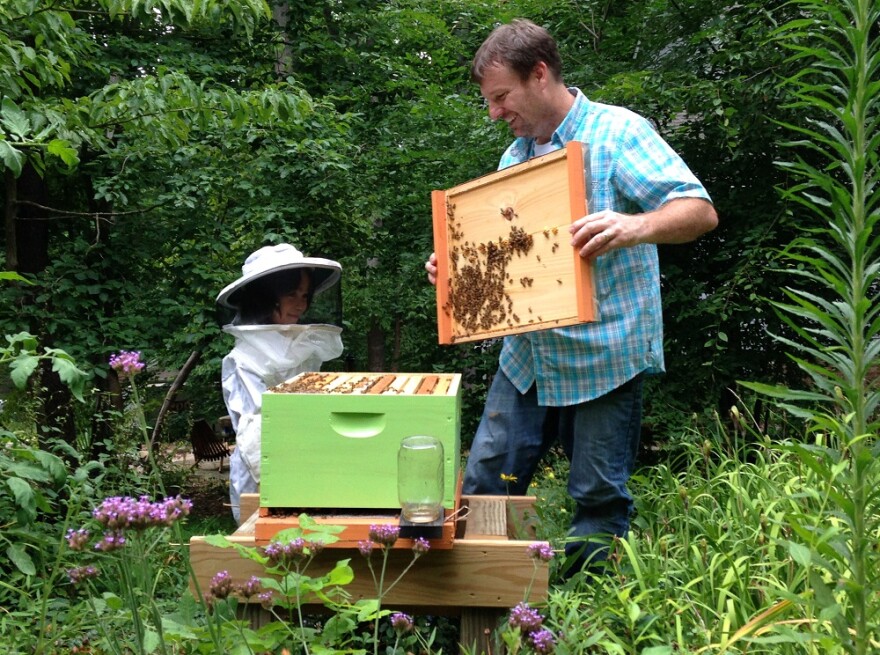Marty Hanksloves everything about bees. He manages colonies in several counties around the state. If bees are bugging you, he will remove them for free. But what makes Marty's business unique is not just that he removes the bees -- many beekeepers do that.
It's that he finds foster families for them.
WUNC's Carol Jackson reports:
Marty's business starts with the bees.
He doesn't order them online, as many beekeepers do. Rather, homeowners who have a honeybee infestation can call Marty instead of an exterminator. Marty will come with his smoke and special tools and remove the bees.

Then, Marty brings the colony to his home in Chapel Hill where he transfers them to a wooden bee house.

Usually the bees stay for a couple of weeks at Marty's place before they get moved to the new "foster family" location. Marty's got people all around the Triangle who've agreed to be foster families. Today the hive from the Raleigh house is headed to Carrboro.
The transfer might be tricky. There was a big storm last night and many of the bees got stuck outside the hive. The normally tranquil hive has dozens of bees buzzing around. Even so, Marty carefully loads the two bee houses onto the back of his truck. When he arrives in Carrboro the women are waiting.
"So did you all sleep last night?" Marty asks Jenny Schnaak and Beth Hopping. The women laugh and confess their excitement.
Marty and the women lift the bee houses from the back of Marty's truck and place them near the front path of the home. Marty opens the bottom of each bee house so that the bees can get to know their new environment. The bees come out pretty quickly.
"So we just drove bumpity, bumpity, bump. That's gonna agitate them," Marty says. "To you it may look like pandemonium, but to me I understand what they are doing. They are flying in an oval, in a big circle, and it gets bigger as they go up. They are imprinting their new image of where their home is."
The women look on in curious fascination. They had prepared for the bees by placing pots of flowering plants nearby, and cups of water. (Foster parents need to make sure there is a water source nearby, otherwise bees might annoy the neighbors looking for water.)
"I'm scared that they won't do well," says Beth Hopping. "And that they won't make it and that I will feel somewhat responsible for that. I think I would be really upset if they for some reason didn't make it."
Location, location, location
Marty Hanks has 45 hives placed with foster families in three counties -- including three cities. He's got some in suburban neighborhoods.

Marty's placed several hives in urban locations as well. He's got an extensive set-up on the rooftop of the Top of the Hill distillery in Chapel Hill. The restaurant uses the fresh honey.


"So this has been a crazy journey."
Marty is relatively new to beekeeping. A few years ago, he would be surprised if you told him that he'd be running such an extensive bee foster family program.
Right before he turned 40, Marty started to think about life and death. Around that time he was reading about the decline of the honeybees. His wife bought him one bee house, and that has turned into this big project. Marty spends about 30 hours a week on the project, on top of his full-time job.
Marty's idea is kind of radical. To get people to buy into the bees. To welcome bee hives to their land. To coexist with bees, rather than see them as pests.
Marty hopes that if we all give space to the bees -- that they will continue to work for us far into the future.
>> Find out more about Marty's project.












